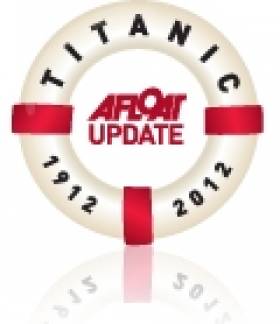Displaying items by tag: Irish maritime lectures
Lecture: MSC Napoli – The Inside Story
#Lecture – The inside story of MSC Napoli, the containership which became the UK's largest, most complicated and most expensive shipwreck and salvage operation and will be the topic of a lecture held on Tuesday 23 April.
Robin Middleton CBE, former Secretary of State Representative of the United Kingdom, who took all the pivotal decisions during the disaster, will present the lecture in the National Maritime Museum of Ireland (NMMI) in Dun Laoghaire.
Lecture begins at 8:00 pm noting an admission fee of € 10. For bookings contact the maritime museum Tel: (01) 2143965, by email: [email protected]
For more information about the Maritime Institute of Ireland's maritime museum visit: www.mariner.ie
Lecture: Shackleton’s Endurance Expeditions: 1914-17
#Lecture – A talk will be given on Shackleton's Endurance Expeditions: 1914-17 next Thursday (21 March) at 8pm in the Stella Maris Club, Beresford Place, Dublin city centre.
All are welcome to the lecture, where there is an entrance fee (recommended donation €5) per person
The Stella Maris Club is located close to the Irish Life (ILAC) Mall complex car park, the Customs House and Busaras. It is convenient to the Luas (Red Line: Busaras stop) and the DART (Connolly and Tara Street stations).
The Maritime Institute runs a maritime museum, the National Maritime Museum of Ireland located in Dun Laoghaire. Co. Dublin. For further details visit: www.mariner.ie
Lecture: Smuggling in the Eighteenth Century
#LectureSmugglers – Following Joe Varley's lecture held last week in the Poolbeg Y&BC Marina, Dublin, there's another chance to hear his lecture "Smuggling in the 18th Century".
The lecture is to take place this Thursday (21 February) at 20.00hrs at Stella Maris Seafarers Club, Beresford Place, in the city-centre.
The illustrated talk is hosted by the Maritime Institute of Ireland and is part of the winter/spring lecture programme.
Varley will demonstrate why the 18th century is regarded as the golden age of smuggling. This contention will be examined from mainly the viewpoint of the smuggler.
Examples of Irish and British smuggling activity will be given, including a detailed example of wool smuggling from Roundstone in Connemara in the 1730's.
The Stella Maris is located close to the Irish Life Mall car park (ILAC), the Customs House and Busaras. It is convenient to the Luas (Red Line: Busaras stop) and DART (either Connolly or Tara Street stations).
The Maritime Institute has a maritime museum, the National Maritime Museum of Ireland located in Dun Laoghaire. Co. Dublin. For further details on lectures, museum and more click HERE.
Below the Surface Lecture Series: ‘Piracy and Predation’
#LecturePIRACY: Continuing the 'Below the Surface' of maritime lectures held monthly, the next talk is on 6 February, the topic will be 'Piracy and Predation in early 17th Century Ireland' presented by Connie Kelleher Phd, A Historical and Archaeological overview.
As usual the lecture takes place below decks on board the replica 19th century famine emigrant barque, Jeanie Johnston, at her berth at Custom House Quay, in Dublin's Docklands.
Doors open at 7.15pm and the lecture starts at 8pm. Please ensure to arrive early as entry to venue may not be permitted on commencement of the lecture. For further details contact 01 4730111 and to book online, tickets costing €15.00 per person click HERE.
Lecture: “Lady Nelson” Lost on the Skelligs
#LECTURES – In addition to the Killiney & Ballybrack Historical Society's hosting of a lecture about the "Lady Nelson" (on 14 Nov) recently reported on Afloat.ie, the talk will also be hosted this month by the Maritime Institute of Ireland (M.I.I.).
Jim Robinson will present the M.I.I. lecture on 15th November (8pm) about the vessel that traded between Dublin and Spain and in which was wrecked on the Skelligs Rock in 1809. The talk will also give an account of trading links with Spain during that time.
The lecture is to be held at the Stella Maris Seafarers Club, Beresford Place, close to the LUAS (Red) Line (Busaras Stop) and the DART stations (Connolly and Tara Street). Car parking is available at the Irish Life Mall on Lower Abbey Street.
Please note that other lectures organised by the M.I.I. may be held in other locations, for more visit www.mariner.ie
All Aboard the 'Jeanie' As Lecture Series Sets Sail
#LECTURES – "Below the Surface" is a new series of six monthly held maritime lectures which are aptly to take place on board the replica barque Jeanie Johnston. The tallship built in Blennerville a decade ago, is now a floating famine museum ship berthed at Custom House Quay in Dublin's Docklands.
The talks will touch on many aspects of our rich and controversial maritime history, from Viking fleets in Dublin bay, through pirates, queens and lost polar expeditions. All told in a most charming setting, while the River Liffey gently sways the hull beneath your chair.
All the lectures will be held on the first Wednesday (8pm) of every month, with the inaugural talk "Searching For Franklin" on 7 November. This will be presented by John Murray, who will examine the ill fated exploration to find the Northwest Passage, undertaken by Captain John Franklin .
Tickets are available online at www.jeaniejohnston.ie/below-the-surface-page.html For further information on the series click HERE
National Heritage Week: Maritime Lecture Programme
#MARINE HERITAGE – Up and down the country, events are been held for the annual National Heritage Week including a series of maritime lectures as previously reported on Afloat.ie
Below is a full detailed description of the varied topics of the lecture programme which is to be held in the Dun Laoghaire Club, Eblana Avenue (off Marine Road) on the final day (Sunday 26th August) of the heritage week.
12 noon The 'Kowloon Bridge' and her sisters – by Garda Diver Peter Brady.
1.15 pm A West of Ireland view of the Battle of the Atlantic – by Dr. Michael Kennedy, Royal Irish Academy.
3.00 pm Early navigation in Ireland / maritime archaeology of Sligo harbour and bay.- by Auriel Robinson DAHG.
4.15 pm Captain Bligh and Dublin Bay- speaker, Terry Cummins of the Irish Naval Association.
6.00 pm The greatest naval catastrophe in England's history-concealed throughout history by Elizabethan propaganda historiography.
This lecture is to be presented by special guest speaker; Dr. Luis Gorrochategui Santos – who is visiting Ireland especially for the heritage week lectures organised by the Maritime Institute of Ireland (M.I.I.) which runs the National Maritime Museum of Ireland.
For further information about the day's lecture contact Barney Yourell on 087 9007466
Admission is free, noting there is a recommended donation of €10
#LECTURES – Les Glénans Irish Seceur's final lecture of the winter series is titled 'The Viking Ship Warriors in Ireland New Discoveries'. John Mass will present the talk about the first Viking raids and settlement in 8th and 9th century Ireland.
The talk takes place next Tuesday, 29th May starting at 20.00hrs at the Poolbeg Yacht & Boat Club Marina in Ringsend, Dublin Port. Tickets cost €5 in aid of the RNLI.
Lecture ‘Fr Brown: From Titanic to Kangaroobie’
#LECTURE – The Old Dublin Society and the RDS are joint organisers of the lecture 'Fr Brown: From Titanic to Kangaroobie' which is to be held at the Ballsbridge venue in Dublin next Wednesday (11th April).
David Davison will be the guest speaker for the lecture that starts at 6pm in the Minerva Suite. Those intending to visit should book by calling (01) 2407 254 or email: [email protected]
The Old Dublin Society which hosts a winter and spring lecture programme is normally hosted in the Dublin City Library and Archive on Pearse Street.
For further information on all lectures visit: www.olddublinsociety.ie
Lecture: ''Madcap'' Me and Other Mad Wans
#LECTURES – The Dublin Bay Old Gaffers Association (DBOGA) last talk of the winter series is 'Madcap, Me and Other Mad Wans' which takes place next Thursday 22nd March (8pm) in Poolbeg YBC, Ringsend.
Adrian Spence, owner skipper of 'Madcap' will present an entertaining talk about his voyage to Greenland. Madcap, built in 1875, is the oldest of the Bristol Channel Pilot Cutters still sailing and is to be found nowadays in the Northern Ireland Old Gaffers fleet.
All are welcome to the evening with proceeds going to the RNLI. For further information about the DBOGA click HERE and the PYBC visit www.poolbegmarina.ie







































































